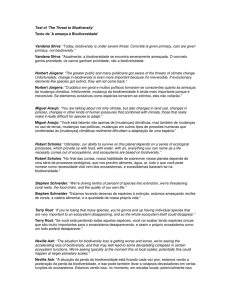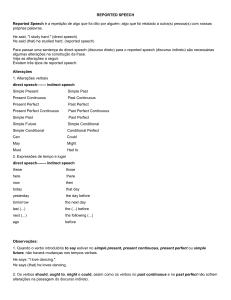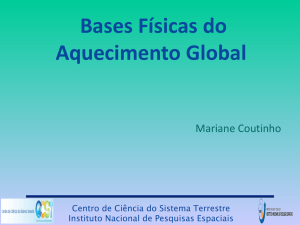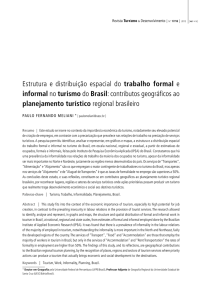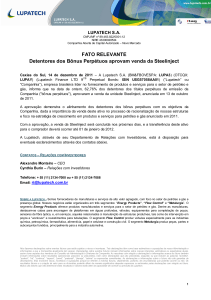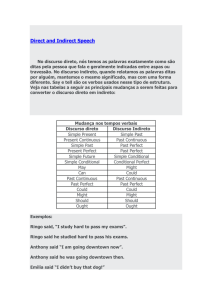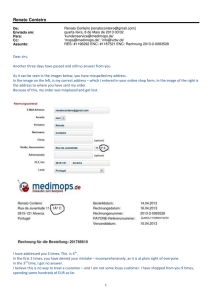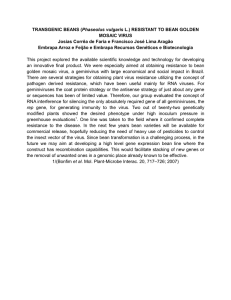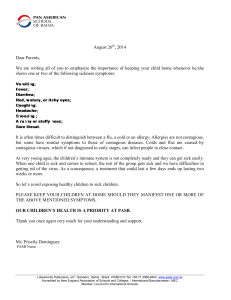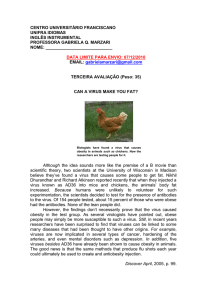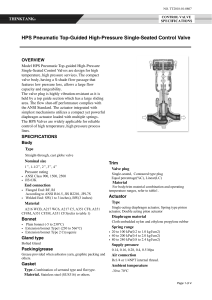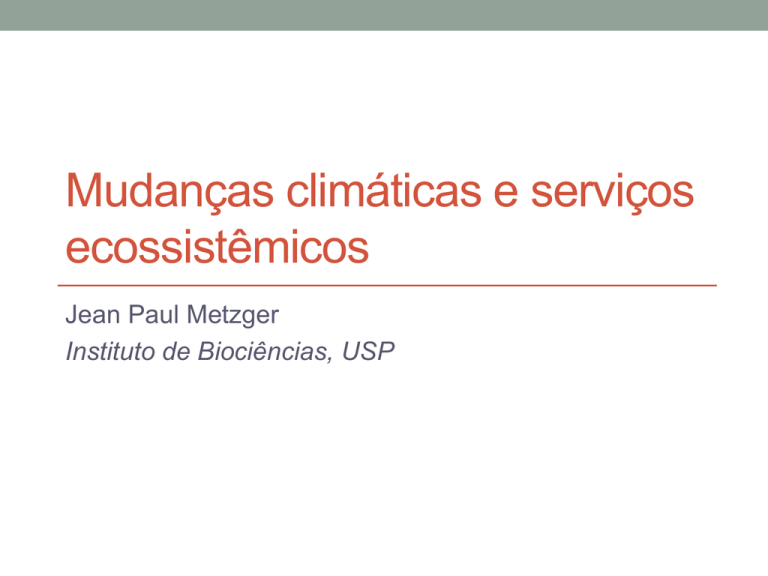
Mudanças climáticas e serviços
ecossistêmicos
Jean Paul Metzger
Instituto de Biociências, USP
Plano
• Duas histórias
• Os serviços ecossistêmicos e o IPBES
• Cenários de mudanças climáticas e os
serviços
Primeira história: a abelha Mandaçaia
Canadian Centre for Climate Modelling and Analysis (CCCMA)
Cenário atual
Cenário otimista (2060)
Cenário pessimista (2060)
Área potencial de ocorrência de 38 espécies arbóreas da Mata Atlântica
(Colombo & Joly 2010; Joly et al. 2014)
> 200 years of plantation
High production
Export: US$ 3 billion / year
Landscape structure influences bee community and coffee
pollination at different spatial scales
Fernanda Teixeira Saturnia*, Rodolfo Jaffé & Jean Paul Metzgera
Perda de US$ 540
millions
Mean increase value is 28%
Segunda história: dois pequenos roedores
Necromys lasiurus
Oligoryzomys nigripes
Fonte: Bonvicino et al., 2008
Hantavirose
- Síndrome Cardiopulmonar
por
Hantavírus (HCPS)
- Letalidade: 30% ~ 50%
- Doença rural, agrícola ou
peri- urbana
• Transmissão
Vírus nas fezes,
saliva e urina
Vírus na forma
aerolisada
Inalação do vírus
HCPS
Perda e fragmentação
de habitat
HCPS
Espécies reservatório
Soropositivos
Perda e fragmentação
de habitat
Perda de espécies
especialistas
Espécies generalistas
mais abundantes
Estrutura da comunidade
Disponibilidade de
alimento
Espécies reservatório
Fragmentos
Cultivos
Interações
intraespecíficas
Soropositivos
HCPS
Climate effects
Precipitation
Temperature
Increases in primary productivity
infection
Contact
Rodent population
Transmission
Climate effects
exposure to sunlight and high
temperatures decrease the time the
virus remains infectious
Infected dried feces,
containing the virus,
become airborne
Precipitation
Environmental conditions
Temperature
Virus survival in the
environment
Infection risk
mouse excreta become dry- virus particles
become airborne much more readily in these
conditions
(Tese de doutorado de Paula Prist)
Current HPS Risk
Sugar cane expansion
RCP85
RCP 45
RCP85 and Sugar cane expansion
RCP45 and Sugar cane expansion
(Prist et al. in prep.)
Baseline model - 6% of the State of São Paulo has medium to high risk for HPS = 39
municipalities
RCP4.5 and sugar cane expansion– 7.13% of the state is classified as medium
to high risk for HPS = 46 municipalities.
Andradina, Presidente Prudente, Monte
Aprazível, Assis and Jaú.
RCP8.5 and sugar cane expansion– 8.7% of the state is classified as medium to
high risk for HPS = 56 municipalities.
Paraguaçu Paulista, Assis, Monte Aprazível,
Pederneiras and Jaú
(Prist et al. in prep.)
• Mudanças climáticas levam não
apenas a mudanças na distribuição
das espécies mas também na
provisão de serviços ecossistêmicos
“Ecosystem services are the direct and indirect
contributions of ecosystems for human well-being”
(TEEB 2010)
IPBES Conceptual Framework
(Diaz et al. 2015)
What is IPBES?
•
Intergovernmental science-policy Platform on
Biodiversity and Ecosystem Services
•
Overall objective: To provide policy relevant
knowledge on biodiversity and ecosystem
services to inform decision making
•
Established in April 2012, Panama
•
124 Members
•
Secretariat hosted in Bonn
IPBES-3 (Jan 2015, Bonn)
IPBES-2 (Dec 2013, Antalya)
Context for the birth of IPBES
• Millennium Ecosystem
Assessment (2005)
• No mechanism to:
– repeat this exercise
– to involve governments
• Call by French President for “an
IPCC like mechanism for
biodiversity”
Scenarios: plausible representations of possible futures for one or more
components of a system, and/or alternative policy or management options
intended to alter the future state of these components
Types of scenarios aligned with phases of the policy cycle
Intervention
scenarios
Policy-screening scenarios
Models: qualitative or quantitative representations of key components of a
system and of relationships between these components
(Schröter et al. 2005)
Mudanças no stress hídrico em função de mudanças climáticas e populacionais
(Schröter et al. 2005)
• Há uma lacuna enorme de
conhecimento sobre as implicações
de diferentes cenários de mudanças
climáticas sobre as funções e os
serviços ecossistêmicos
Obrigado
Dept. of Ecology – University of São Paulo
[email protected]
http://ecologia.ib.usp.br/projetointerface/

